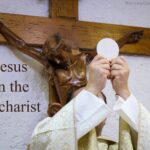
Catholics should strive to be in communion with the Lord in all that they do. By making a Spiritual Communion, they can place themselves in the presence of Jesus Christ and lovingly unite their hearts to Jesus in the Eucharist.
The primary means that Catholics become more united with God is the sacraments, especially through the Eucharist. The most perfect expression of communion with the Lord is receiving Jesus’ Body, Blood, Soul, and Divinity.
Spiritual Communion is a powerful way of receiving the effects of Holy Communion when the Eucharist is not available or when circumstances do not allow someone to receive Communion or be with the community of the Church.
A Spiritual Communion should be made with the same disposition as when receiving Jesus in the the form of bread and wine in the Sacrament of the Eucharist.
Spiritual Communion can be made anytime and Catholics are encouraged to make spiritual communions throughout the day and in preparation for reception of the Eucharist at Mass.
There is no official formula for making a Spiritual Communion but several prayers are available to help Catholics in their desire to be more united with Jesus.
Jesus promises an intimate union:
Connecting with God:
Uniting hearts and intentions to the Mass:
So Jesus said to them, “Amen, amen, I say to you, it was not Moses who gave them bread from Heaven; my Father gives you the true bread from Heaven. For the bread of God is that which comes down from Heaven and gives life to the world.” So they said to Him, “Sir, give us this bread always.” Jesus said to them, “I am the bread of life; whoever comes to Me will never hunger, and whoever believes in Me will never thirst.”
John 6: 32-35
Securing the effects of the Communion:
Yearning for grace:
God responds to our spiritual desire:
Having passed from this world to the Father, Christ gives us in the Eucharist the pledge of glory with Him. Participation in the Holy Sacrifice identifies us with his Heart, sustains our strength along the pilgrimage of this life, makes us long for eternal life, and unites us even now to the Church in Heaven, the Blessed Virgin Mary, and all the saints.
Catechism of the Catholic Church 1419
A practice with great value and great power:
Spiritual Communion does not replace the Eucharist:
The Eucharist thus appears as the culmination of all the sacraments in perfecting our Communion with God the Father by identification with his only-begotten Son through the working of the Holy Spirit. With discerning faith a distinguished writer of the Byzantine tradition voiced this truth: In the Eucharist “unlike any other sacrament, the mystery [of Communion] is so perfect that it brings us to the heights of every good thing: Here is the ultimate goal of every human desire, because here we attain God and God joins Himself to us in the most perfect union.” Precisely for this reason it is good to cultivate in our hearts a constant desire for the sacrament of the Eucharist. This was the origin of the practice of “Spiritual Communion”, which has happily been established in the Church for centuries and recommended by saints who were masters of the spiritual life.
Pope John Paul II, Ecclesia de Eucharistia, 17 April 2003
A deeper and deeper imagination:
Let Jesus Christ love you:
The Truth, Goodness, and Beauty of the Catholic Church
The Holy Eucharist, here and now:
Share this page with friends and family to start a conversation about your faith.
Don’t miss a post. Learn more about the Catholic Church and strengthen your Catholic faith.
Find more Fiercely Catholic video issues here.
Subscribe here.


